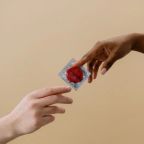Chlamydia
Chlamydia is a bacterial infection and one of the most common sexually transmitted infections (STIs) in the UK – particularly amongst teenagers and young adults.
It’s passed on through unprotected sex (without a condom).
Here we will discuss the signs and symptoms of chlamydia, as well as, how to get tested and treated.
Chlamydia
Chlamydia is a bacterial infection and one of the most common sexually transmitted infections (STIs) in the UK – particularly amongst teenagers and young adults.
It’s passed on through unprotected sex (without a condom).
Here we will discuss the signs and symptoms of chlamydia, as well as, how to get tested and treated.
Signs and Symptoms
It’s very common for people with chlamydia to not notice any signs or symptoms and not be aware they have it.
If you do show symptoms, they may include:
- Pain when peeing
- Unusual discharge from the vagina, penis or bottom
- In born women, stomach pain, bleeding after sex or bleeding between periods
- In born men, pain and swelling in the testicles
How is it Transmitted?
Chlamydia can be spread through unprotected sex or just by being in contact with infected genital fluids (semen or vaginal fluid).
Here are some of the ways you can get it:
- Unprotected vaginal, anal or oral sex
- Sharing unwashed sex toys
- Your genitals coming into contact with your partner’s genitals (even if there’s no penetration or ejaculation)
- Infected semen or vaginal fluid getting into your eye
How to Get Tested
The free, easy and discreet way to discover if you have an STI.
Call our Helpline
Speak to a friendly advisor and get the advice and support you need.
You’re not alone.
There are people who care about you and want to help you through this.
Prevention
You can prevent the spread of and contracting chlamydia by:
- Using a condom every time you have vaginal or anal sex
- Using a condom to cover the penis during oral sex
- Using a dam (a piece of thin, soft plastic or latex) to cover the female genitals during oral sex or when rubbing female genitals together
- Avoid sharing sex toys without washing in-between uses
Treatment
Luckily chlamydia is easily treatable with antibiotics. After testing positive using our STI self-test kit, you will be prescribed the right antibiotics for you.
You can also inform your current sexual partner or other recent sexual partners, so they can get tested as well – this will help stop the spread of the infection.
If you’re under 25 you will be sent another test in 3-6 months after being treated. This is because young people are more likely to catch it again.
FAQs
Chlamydia
Clear answers to common questions
Contacting a sexual health service for the first time may be a little daunting, especially if you’re not keen on talking to someone. So, here are answers to some of the questions we get asked a lot.
Is chlamydia serious?
Chlamydia is usually a minor illness which can be treated easily with antibiotics. However, if left untreated for a long time the infection can spread to other areas of the body – causing more long-term health issues. This can be prevented by testing after each new sexual partner.
How soon do symptoms appear?
You will usually see symptoms appear between 1-3 weeks after unprotected sex. However, they can appear much later than that with a large proportion of people not showing any symptoms.
What should I do if I think I have chlamydia?
If you think you may have an STI you should take an STI self-test or visit your GP or local sexual health clinic.
How do I get tested?
You can test yourself at home. To order a test click here. For information on how to take a test visit our resource hub.










